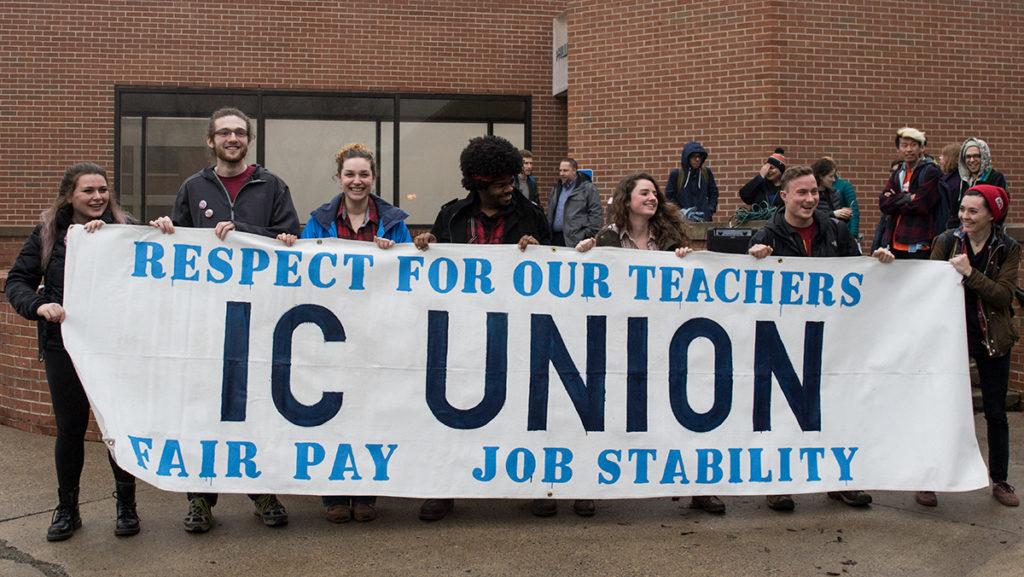Despite the fog rolling over Ithaca College’s campus March 28, students, faculty and staff gathered at Free Speech Rock to celebrate the contract the contingent faculty unions and administration settled on after months of bargaining.
Members of the contingent faculty unions, as well as members of the college’s community that helped support them through the bargaining process, spoke to a crowd of about 30 students, faculty and staff about the struggles they faced while negotiating their contract.
The contingent faculty unions entered bargaining sessions with the goals of job security and higher compensation, which they reached. They settled on a 24 percent raise over four years and eligibility for two-year contracts for part-time contingent faculty members if they have worked at the college for over three years. Full-time contingent faculty members who have worked at the college for three years are eligible for two-year contracts, and those who have worked at the college for five years are eligible for three-year contracts.
Zeke Perkins, the union’s Service Employees International Union representative, said he was initially skeptical about the demands that the contingent unions were making and whether the separate part time– and full time–contingent faculty unions would be recognized as one bargaining unit by the administration. He said he was impressed by the success of the unions.[acf field=”code1″]
“This is the best contract for contingent faculty in the state of New York,” Perkins said. “The administration didn’t bargain until the last week. … They were scared, and that was because of everyone that’s here and even everyone that’s not here.”
Brody Burroughs, lecturer in the Department of Art and a member of the bargaining committee, said the results of the bargaining sessions have made him proud to work at the college.
“I’m really proud today to be a member of this community,” Burroughs said. “There’s something to be said about making your workplace better and your life better through hard work and determination.”
Senior Catherine Proulx, one of the organizers for IC Students for Labor Action, said she has been working with the contingent faculty members since she got involved with IC Progressives during her sophomore year. Now, she said, it’s nice to see the results of the work that she has done.
“I’m so happy that I get to graduate and know that the professors have a better contract and know that I don’t have to worry about actions not happening,” Proulx said. “It’s been a big relief to have that peace of mind and to also know that the faculty at IC can have that peace of mind.”
Pete Meyers, a founding member of the Tompkins County Workers’ Center, said the effort made by the members of the contingent faculty unions was not only impressive but also important for the national problems that contingent faculty members face in higher education.
“This whole movement … this has been a great unionizing effort, and probably one of the most serious unionizing efforts that I’ve ever been a part of,” Meyers said. “This is a really big kick for the contingent faculty movement around the country.”[gss ids=’24567,24564,24566,24568,24571′ carousel=’fx=carousel’ options=’loop=2&pause-on-hover=true&timeout=2000′]
Freshman Margaret McKinnis, member of IC Students for Labor Action, said she is not yet sure if the agreement struck between the administration and the unions is indicative of a national shift for the contingent faculty movement.
“It feels almost like we’re the pioneers of this problem,” McKinnis said. “In New York, we’re the best package. … So I think it’s hard to tell at this point, but I’m really hopeful.”
Megan Graham, assistant professor of writing, said that faculty members at other colleges, such as the nearby Wells College, have unionized and are fighting for better treatment, but not many colleges have made as much progress as the unions at IC have. Despite their agreement, she said, it is not time yet to relax on pushing for labor action on the college’s campus.
“The janitorial staff at this institution are not unionized, and they suffer unbearable conditions,” Graham said. “And they need some help, so we’re going to help them. Sodexo — look at that company and what they’re doing to their workers. … We’ve got to help them. We’ve got to stand up for them.”








